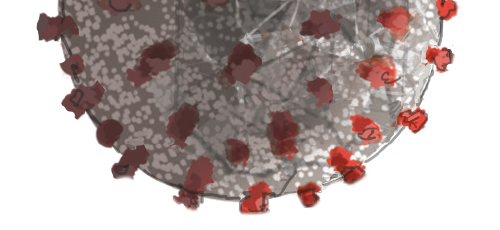
Longer See Me
’m not trying to complain or make excuses, I hate that I even have to ask, but I’m not able to make the deadline on this assignment,” Kenny Lam wrote in an email to Tammy Scott late one night in March. “I’ve just got a lot going on and am a little stressed out. I hate to do this, but I’m requesting an extension if possible.”
As Scott, PhD, RN, BC, assistant professor in the School of Nursing, reads Lam’s email, the words written aren’t necessarily alarming, but the tone seems off. She’s board-certified in psychiatric mental health and feels the need to reach out, even though it would be easier to just reply to the email and grant the extension. She requests a phone call and Lam, a student in the RN to BSN program, calls her immediately.
Scott learned he was working 50-plus hours a week in the medical intensive care unit caring for COVID-19 patients at UMC Health System in Lubbock.
“There’s not enough COVID-19 nurses, not enough resources and protective equipment, my family in Houston lost their jobs, and I care for my family in Vietnam as well — I’m the only financial resource they have right now,” Lam told Scott. “My mom has kidney disease, both my aunt and uncle are considered to have compromised health, too, so that’s scary.”
But above all, his patient died that day.
Lam’s only responsible for two patients at a time — the critical COVID-19 patients need round-the-clock care. It’s a different challenge for him, because he’s always vowed that no patient in his charge would die alone, yet on this floor with COVID-19, he finds himself at a crossroads. The health of one of his patients is failing; however, his other patient needs to be intubated immediately.
Lam stands there for a minute, slowly accepting the inevitable — his patient is gone. He knows he did all he could to provide the best care possible, and that he will continue to do so for the rest of his career.
“I don’t believe that a pandemic can stop me from being the nurse I knew I could be. All they can see are my eyes,” Lam said. “I’m completely covered: mask, face shield, gown, gloves, goggles, surgical cap. Everything is covered except for my eyes, so I try to show them I’m there and I feel for them, and I’ll be with them until they can’t see me anymore.”
On the phone, Lam cries for the second time that day. “I hate asking for an extension. I hate making excuses.”
Scott cuts him off, “You are not making excuses — this is an incredibly unique situation. In my 30 years of nursing, a lot of which was with infectious disease patients, I have never experienced this before. I will work with you. Your other professors will work with you — you’ve got this.”
And for the next few minutes, Scott cries with him.
“In that moment, the priority was letting my student know that I hear him and feel his pain,” Scott said. “While he’s on the front lines making sure his patients aren’t alone, I wanted to provide him the same service as his educator. I wanted him to know that, even though he is a distance education student, we didn’t have to be distant.”